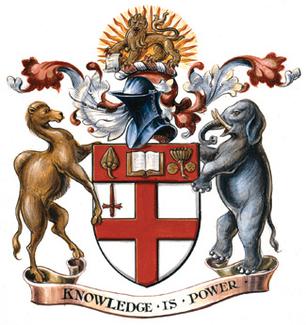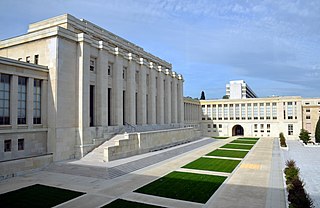Related Research Articles
The Library of Congress Classification (LCC) is a system of library classification developed by the Library of Congress in the United States, which can be used for shelving books in a library. LCC is mainly used by large research and academic libraries, while most public libraries and small academic libraries used the Dewey Decimal Classification system. The classification was developed by James Hanson, with assistance from Charles Martel, in 1897, while they were working at the Library of Congress. It was designed specifically for the purposes and collection of the Library of Congress to replace the fixed location system developed by Thomas Jefferson.

The Universal Declaration of Human Rights (UDHR) is an international document adopted by the United Nations General Assembly that enshrines the rights and freedoms of all human beings. Drafted by a UN committee chaired by Eleanor Roosevelt, it was accepted by the General Assembly as Resolution 217 during its third session on 10 December 1948 at the Palais de Chaillot in Paris, France. Of the 58 members of the United Nations at the time, 48 voted in favour, none against, eight abstained, and two did not vote.
Realpolitik is the approach of conducting diplomatic or political policies based primarily on considerations of given circumstances and factors, rather than strictly following ideological, moral, or ethical premises. In this respect, it shares aspects of its philosophical approach with those of realism and pragmatism. It is often simply referred to as pragmatism in politics, e.g. "pursuing pragmatic policies" or "realistic policies".

SOAS University of London is a public research university in London, England, and a member institution of the federal University of London. Founded in 1916, SOAS is located in the Bloomsbury area of central London.

A librarian is a person who works professionally in a library providing access to information, and sometimes social or technical programming, or instruction on information literacy to users.
A tertiary source is an index or textual consolidation of already published primary and secondary sources that does not provide additional interpretations or analysis of the sources. Some tertiary sources can be used as an aid to find key (seminal) sources, key terms, general common knowledge and established mainstream science on a topic. The exact definition of tertiary varies by academic field.

Who's Who is a reference work. It has been published annually in the form of a hardback book since 1849, and has been published online since 1999. It has also been published on CD-ROM. It lists, and gives information on, people from around the world who influence British life. Entries include notable figures from government, politics, academia, business, sport and the arts. Who's Who 2023 is the 175th edition and includes more than 33,000 people.

HeinOnline (HOL) is a commercial internet database service launched in 2000 by William S. Hein & Co., Inc., a Buffalo, New York publisher specializing in legal materials. The company began in Buffalo, New York, in 1961, and is currently based in nearby Getzville, NY. In 2013, WSH Co. was the 33rd largest private company in western New York, with revenues of around $33 million and more than seventy employees.

A law library is a special library used by law students, lawyers, judges and their law clerks, historians and other scholars of legal history in order to research the law. Law libraries are also used by people who draft or advocate for new laws, e.g. legislators and others who work in state government, local government, and legislative counsel offices or the U.S. Office of Law Revision Counsel and lobbying professionals. Self-represented, or pro se, litigants also use law libraries.

The Law Library of Congress is the law library of the United States Congress. The Law Library of Congress holds the single most comprehensive and authoritative collection of domestic, foreign, and international legal materials in the world. Established in 1832, its collections are currently housed in the James Madison Memorial Building of the Library of Congress. Law staff rely on and utilize 2.9 million volumes of primary legal sources, 102.18 million microforms, 99,000 reels of microfilm, 3.18 million pieces of microfiche, and 15,600 tangible electronic resources, making it is the largest law library in the world.

The Dag Hammarskjöld Library is a library on the grounds of the headquarters of the United Nations, located in the Turtle Bay/East Midtown neighborhood of Manhattan in New York City. It is connected to the Secretariat and Conference buildings through ground level and underground corridors. It is named after Dag Hammarskjöld, the second Secretary-General of the United Nations. The library was founded in 1946, and the current library building was completed in 1961.

The United Nations Office at Vienna (UNOV) is one of the four major office sites of the United Nations where numerous different UN agencies have a joint presence. The office complex is located in Vienna, the capital of Austria, and is part of the Vienna International Centre, a cluster of several major international organizations. UNOV was established on 1 January 1980, and was the third such complex to be created.

Michigan State University Libraries is the academic library system of Michigan State University in East Lansing, Michigan, United States. The library system comprises nine branch locations including the Main Library. As of 2021-22, the MSU Libraries ranked 26th among U.S. and Canadian research libraries by number of volumes and 7th among U.S. and Canadian research libraries by number of titles held.
The Free Expression Policy Project (FEPP) is an organization devoted to assisting researchers with assembling information related to freedom of speech, media democracy, and copyright, and advocating for these issues. Civil liberties lawyer Marjorie Heins founded the nonprofit organization in 2000. Based in Manhattan, New York, it was initially associated with the National Coalition Against Censorship, and subsequently operated as part of the Democracy Program of the Brennan Center for Justice at New York University Law School.

An international organization, also known as an intergovernmental organization or an international institution, is an organization that is established by a treaty, or is an instrument governed by international law and possessing its own legal personality, such as the United Nations, the World Health Organization, Save the Children International, International Union for Conservation of Nature, and NATO. International organizations are composed of primarily member states, but may also include other entities, such as other international organizations, firms, and nongovernmental organizations. Additionally, entities may hold observer status. An alternative definition is that an international organization is a stable set of norms and rules meant to govern the behavior of states and other actors in the international system.

The United Nations Department of Global Communications (DGC) is a department of the Secretariat of the United Nations. It is tasked with raising public awareness and support of the work of the United Nations through strategic communications campaigns, media and relationships with civil society groups.
Libraries are provided in many prisons. Reading materials are provided in almost all federal and state correctional facilities in the United States. Libraries in federal prisons are controlled by the Federal Bureau of Prisons, U.S. Department of Justice. State prison libraries are controlled by each state's own department of corrections. Many local jails also provide library services through partnerships with local public libraries and community organizations. These resources may be limited, mostly provided through government sources.

The Balme Library, established in 1948 is located on the main campus of the University of Ghana. The Balme Library was named after David Mowbray Balme, the first Principal of the University of Ghana. The Balme Library is the main library of the University of Ghana and is also the largest within the University of Ghana Library System (UGLS). It is endowed with information resources, IT infrastructure and expert staff. Since its establishment in 1948, the library has gone through successive growth with its printed book collection totaling over 400,000 volumes. The library subscribes to an increasing number of online databases including electronic journals (e-journals) and electronic books (e-books).
Indigenous librarianship is a distinct field of librarianship that brings Indigenous approaches to areas such as knowledge organization, collection development, library and information services, language and cultural practices, and education. The Encyclopedia of Library and Information Sciences states that Indigenous librarianship emerged as a "distinct field of practice and an arena for international scholarship in the late twentieth century bolstered by a global recognition of the value and vulnerability of Indigenous knowledge systems, and of the right of Indigenous peoples to control them."

Micronations and the Search for Sovereignty is a 2021 book by Australian constitutional law specialists Harry Hobbs and George Williams about micronations and their legal status. Written from an academic perspective, it is one of few works on micronational movements and the earliest-published book to focus largely on the legal aspect of micronations. The book concerns the definition of statehood, the place of micronations within international law, people's motivations for declaring them, the micronational community and the ways by which such entities mimic sovereign states. In 2022 Hobbs and Williams published a book for a broader audience, How to Rule Your Own Country: The Weird and Wonderful World of Micronations.
References
- ↑ Doherty, Ben. "Law Library Guides: Foreign Law Guide: Country Information". University of Virginia. Retrieved 2022-10-11.
- ↑ Brennan, David. "Hoover Library: *Political Science: World Politics". McDaniel College. Retrieved 2022-10-11.
- ↑ "Reference Materials". National Oceanic and Atmospheric Administration. Retrieved 2022-10-11.
- ↑ "World statesman". Library of Congress, Washington, D.C. 20540 USA. Retrieved 2022-10-11.